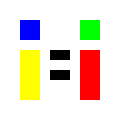- 기타계산기 기타
[CANON] [F-789SGA] 공학용 계산기 소개
1. [F-789SGA]
http://www.canon.co.uk/for_home/product_finder/calculators/scientific/f_789sga/
설명서 (영문) http://www.canon-ebm.com.hk/download/manual/F-789SGA/F-789SGA%20Englis%20_P.pdf
Detailed Features
Take a more detailed look into the Canon F-789SGA
Energy-saving efficiency
The F-789SGA features a practical dual power source. Solar power ensures maximum energy saving, whilst back-up battery power means this calculator never lets you down whatever the light conditions. The ‘auto power-off’ function switches the calculator off when not touched or not in use after 7 minutes, saving even more energy. Also this calculator has a replaceable battery for a long life, typically four years, unlike some calculators that have to be disposed of after single battery use.
High-end scientific calculator
The F-789SGA is the first high-end Textbook Style Display model in Canon’s scientific category. It comes with 605 advanced functions, including 79 built-in constants and 172 patterns of unit conversion. The metallic silver upper case and thin body reflect a professional image. The LCD display measures 60mm by 25mm. As well as students, it is suitable for teachers, engineers and other professionals.
Powerful memory functions
Additional functions include 19 memories, up to 4x4 Matrix calculations and Equation operation – this is one of the most powerful specifications on the market. All of these functions simplify complicated calculations.
Sustainable design
The F-789SGA calculator is part-manufactured from recycled Canon product material to make the top case, bottom case, battery cover and hard case of the calculator. This maximises resource efficiency and minimises wastage.
Product specification
DISPLAY
Digits
Up to 18 Digits
Type
Textbook Display Scientific Calculator with Recycled material.
Battery Indicator
Yes
Digit Comma Separator
Yes
Display Screen Size
61 x 25 mm
Display Character Size
96 x 31 dot (one line Character: 15)
FUNCTIONS
Constant Calculation
Yes, up to 79
Decimal Selector
Yes
Rounding
Yes
Grand Total
Yes
Item Counter
Yes
Key Roll-Over
Yes, 2 Key Roll-Over
Metric Conversion
Yes
KEYBOARD
Keyboard Layout
Normal
Percentage
% +/-
O Key(s)
0
Keytops
Rubber with Metal Dome
Shift key
Yes
Square Root
Yes
Clear keys
[ON/CA], [CE/C], [CLR] (Memory, Mode, All)
FEATURES
Cover
Yes
Auto-power Off
Yes - 7 minutes
Slide Switches/Selectors
Main ON/OFF Switch
OTHER
Memory
Memory store, Memory Recall
Power Source
Dual Source Solar & Battery
Battery
CR2032 x 1
Body Size (L x W x H)
171 x 86 x 17.3 mm (with cover)
Body Colour
Silver Spray
Weight
120g with Cover
Packaging Info
Double Blister, Manual Contains 21 Languages
댓글3
- 1


세상의모든계산기 님의 최근 댓글
엑셀 파일로 만드니 전체 160~200MB 정도 나옵니다. 읽고 / 저장하는데 한참 걸리네요. 컴 사양을 좀 탈 것 같습니다. -> 엑셀/한셀에서 읽히지만, 구글 스프레드시트에서는 열리지 않네요. 100만 개 단위로 끊어서 20MB 정도로 분할해 저장하는 편이 오히려 속 편할 것 같습니다. -> 이건 구글 스프레드시트에서도 열리긴 하네요. (약간 버퍼링?이 있습니다) 2026 02.10 엑셀 / 행의 최대 개수, 열의 최대 개수, 셀의 최대 개수 엑셀의 행 개수 제한은 파일 형식에 따라 다르며, 최신 .xlsx 파일 형식은 시트당 최대 1,048,576행까지 지원하지만, 구형 .xls 파일은 65,536행으로 제한됩니다. 따라서 대용량 데이터를 다룰 때는 반드시 최신 파일 형식(.)으로 저장해야 하며, 행과 열의 총 수는 1,048,576행 x 16,384열이 최대입니다. 주요 행 개수 제한 사항: 최신 파일 형식 (.xlsx, .xlsm, .xlsb 등): 시트당 1,048,576행 (2^20). 구형 파일 형식 (.xls): 시트당 65,536행 (2^16). 그 외 알아두면 좋은 점: 최대 행 수: 1,048,576행 (100만여개) 최대 열 수: 16,384열 (XFD) 대용량 데이터 처리: 65,536행을 초과하는 데이터를 다루려면 반드시 .xlsx 형식으로 저장하고 사용해야 합니다. 문제 해결: 데이터가 많아 엑셀이 멈추거나 오류가 발생하면, 불필요한 빈 행을 정리하거나 Inquire 추가 기능을 활용하여 파일을 최적화할 수 있습니다. 2026 02.10 [일반계산기] 매출액 / 원가 / 마진율(=이익율)의 계산. https://allcalc.org/20806 2026 02.08 V2 갱신 (nonK / K-Type 통합형) 예전에는 직접 코드작성 + AI 보조 하여 프로그램 만들었었는데, 갈수록 복잡해져서 손 놓고 있었습니다. 이번에 antigravity 설치하고, 테스트 겸 새로 V2를 올렸습니다. 직접 코드작성하는 일은 전혀 없었고, 바이브 코딩으로 전체 작성했습니다. "잘 했다 / 틀렸다 / 계산기와 다르다." "어떤 방향에서 코드 수정해 봐라." AI가 실물 계산기 각정 버튼의 작동 방식에 대한 정확한 이해는 없는 상태라서, V1을 바탕으로 여러차례 수정해야 했습니다만, 예전과 비교하면 일취월장 했고, 훨씬 쉬워졌습니다. 2026 02.04 A) 1*3*5*7*9 = 계산 945 B) √ 12번 누름 ㄴ 12회 해도 되고, 14회 해도 되는데, 횟수 기억해야 함. ㄴ 횟수가 너무 적으면 오차가 커짐 ㄴ 결과가 1에 매우 가까운 숫자라면 된 겁니다. 1.0016740522338 C) - 1 ÷ 5 + 1 = 1.0003348104468 D) × = 을 (n세트) 반복해 입력 ㄴ 여기서 n세트는, B에서 '루트버튼 누른 횟수' 3.9398949655688 빨간 부분 숫자에 오차 있음. (소숫점 둘째 자리 정도까지만 반올림 해서 답안 작성) 참 값 = 3.9362834270354... 2026 02.04